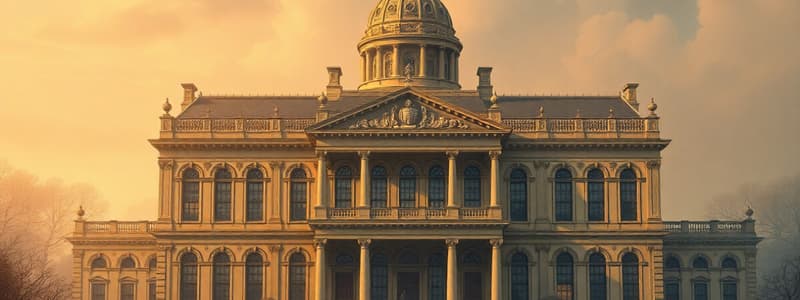Podcast
Questions and Answers
In which system of government are the legislative and executive branches closely connected?
In which system of government are the legislative and executive branches closely connected?
- Presidential system
- Oligarchy
- Parliamentary System (correct)
- Monarchy
What is the primary function of the Judicial branch of government?
What is the primary function of the Judicial branch of government?
- Enforcing laws
- Interpreting laws (correct)
- Creating laws
- Deciding on matters of national security
Which of the following statements accurately describes the separation of powers in the Presidential System?
Which of the following statements accurately describes the separation of powers in the Presidential System?
- The legislative and executive branches are completely independent of each other. (correct)
- The executive branch has complete control over the legislative branch.
- The judicial branch acts as a mediator between the legislative and executive branches.
- The legislative and executive branches share power equally.
Which of these international organizations is responsible for maintaining global peace and security?
Which of these international organizations is responsible for maintaining global peace and security?
What is the primary purpose of Civil Law?
What is the primary purpose of Civil Law?
What is the main aim of the separation of powers in a government?
What is the main aim of the separation of powers in a government?
What is a key characteristic of the Parliamentary System?
What is a key characteristic of the Parliamentary System?
Which statement accurately describes the role of federal laws?
Which statement accurately describes the role of federal laws?
What is the primary function of the legislative branch of government?
What is the primary function of the legislative branch of government?
Which of these is NOT a core principle of the separation of powers in a presidential system?
Which of these is NOT a core principle of the separation of powers in a presidential system?
Which type of law deals with disputes between individuals?
Which type of law deals with disputes between individuals?
What is the main purpose of the United Nations?
What is the main purpose of the United Nations?
Which of the following is TRUE about Federal laws?
Which of the following is TRUE about Federal laws?
Which of the following is NOT a characteristic of local laws?
Which of the following is NOT a characteristic of local laws?
What is the most likely consequence of a society without any laws or order?
What is the most likely consequence of a society without any laws or order?
Which of these is a key difference between criminal laws and civil laws?
Which of these is a key difference between criminal laws and civil laws?
Flashcards
Parliamentary System
Parliamentary System
A government system where legislative and executive branches are closely connected.
Separation of Powers
Separation of Powers
The division of government responsibilities into distinct branches to limit any one branch from exercising the core functions of another.
Civil Law
Civil Law
A legal system that resolves disputes between individuals rather than punishing criminal acts against the state.
Judiciary
Judiciary
Signup and view all the flashcards
The United Nations
The United Nations
Signup and view all the flashcards
Legislative Branch
Legislative Branch
Signup and view all the flashcards
Executive Branch
Executive Branch
Signup and view all the flashcards
Federal Laws
Federal Laws
Signup and view all the flashcards
Three Branches of Government
Three Branches of Government
Signup and view all the flashcards
Criminal Laws
Criminal Laws
Signup and view all the flashcards
Local Laws
Local Laws
Signup and view all the flashcards
Federal Laws vs Local Laws
Federal Laws vs Local Laws
Signup and view all the flashcards
Purpose of the United Nations
Purpose of the United Nations
Signup and view all the flashcards
Study Notes
Learning Objectives
- Explain how laws are created and enforced in different government systems.
- Examine the role of the judicial system in various contexts (local, national, international).
General Instructions
- Study from the worksheet.
- Maintain notebook work as instructed.
Choose the Correct Options
- Question 1: A parliamentary system is a government where the legislative and executive branches are closely connected.
- Question 2: Assertion: The Presidential System of Government has a separation of powers. Reason: Separation of powers aims to make branches of government check each other's power. Correct Answer: The assertion is correct, but the reason is incorrect.
- Question 3: Civil law resolves disputes between individuals.
Federal Laws
- Federal laws apply to the entire country.
- Federal courts deal with federal laws.
Local Laws
- Local laws apply to specific regions (towns, cities, states, etc.).
- Local courts deal with local laws.
Branches of Government
- Legislature: Creates laws.
- Executive: Carries out laws.
- Judiciary: Interprets laws.
Separation of Powers
- Separation of powers divides power among different branches of government to prevent abuses of power.
- Each branch has independent powers and can check the power of other branches.
Civil vs. Criminal Laws
- Civil laws deal with disputes between individuals.
- Criminal laws deal with violations of state or national laws.
Power Up Question
- What would happen to a country without laws and order? Potential answers: chaos, instability, political turmoil, and loss of trust in the government.
United Nations
- The United Nations was established in 1945 to help countries cooperate and manage international disputes.
Studying That Suits You
Use AI to generate personalized quizzes and flashcards to suit your learning preferences.




